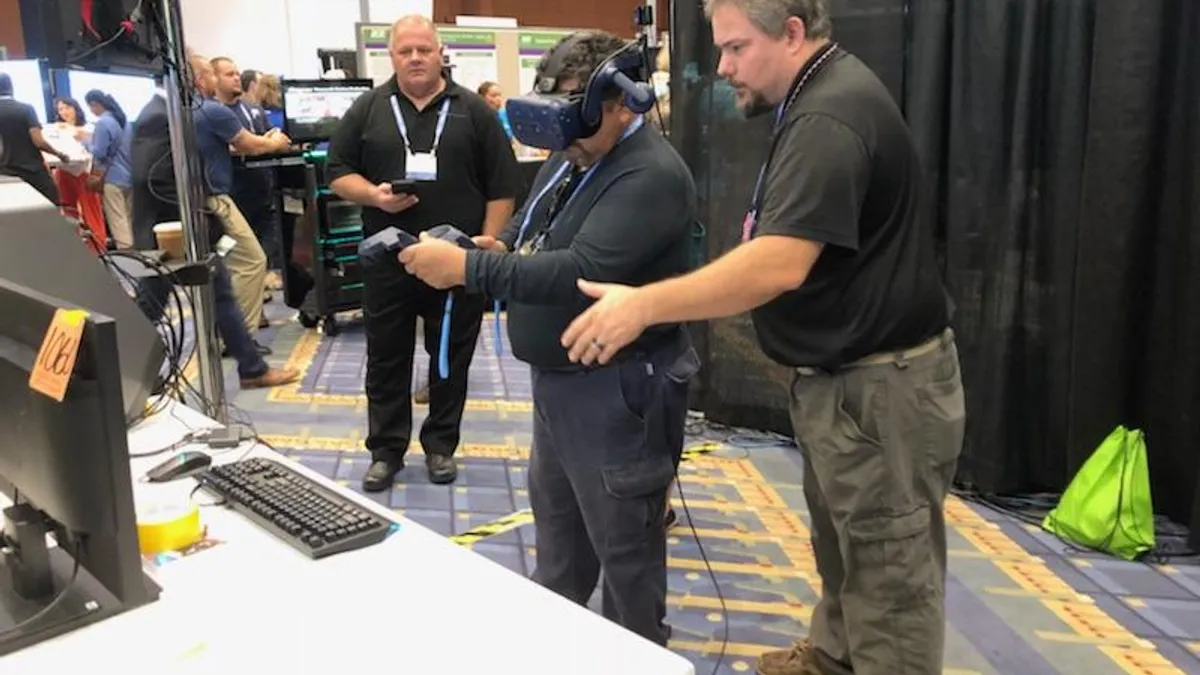Cities and energy companies must encourage innovation and risk-taking among employees, speakers agreed at the Exelon Innovation Expo in Washington, DC on Thursday.
Around 4,000 attendees, comprised of employees of the major energy company and its subsidiaries as well as city officials, discussed the future of energy in cities as more wrestle with climate change and look to hit the ambitious targets of the Paris climate accord.
To do that, Amy Bailey, director of the nonprofit Center for Climate and Energy Solutions (C2ES) called for a "culture of permission," which empowers employees in both the public and private sectors to try new things without fear of reprisals if something does not quite work.
During a panel discussion of city leaders, it was pointed out that much of that innovation has happened around the use of data and sensors, two areas that have grown in importance as cities look to become smarter and more efficient.
To help with controlling waste and getting the number of rats on its streets under control, Washington, DC has put sensors in its trash cans that alert workers when they are full. That way, trash collectors can have optimized routes, while rats should have less overflowing trash cans to visit.
"It's not a sexy issue, but people want to talk about these kinds of issues in the commercial corridors and residential areas, so we use technology and data to help with that," DC City Administrator Rashad Young said.
Kendra Parlock, Director of the Baltimore Mayor's Office of Sustainable Solutions, said the city's program to convert its streetlights to use LED bulbs is helping with energy efficiency but also is a key part of the city's wider efforts to reduce crime.
Each day, 20 city agencies come together to discuss high-crime areas and any recent incidents, and to fix issues that may encourage bad behavior, like streetlight outages. Those are then fixed that day, Parlock said. "It's not just about doing stuff that's cool, it's about doing what's right at the right time."
And innovation does not have to mean new technological advances. In his opening remarks, Exelon president and CEO Chris Crane gave the example of a company employee figuring out the six fittings that typically degrade and cause gas leaks. Then, the Exelon worker took a more active role by creating a toolkit to help homeowners get them fixed, rather than just shutting off the gas. That kind of innovation, Crane said, may not be flashy but is effective.
"That was innovative, and it didn't involve digitization, it didn't involve technology," he said in a speech. "It involved employing your brain and finding ways to be more efficient."
Indeed, innovation can come in the most unexpected of ways, especially in cities. Bailey cited the growth of dockless electric bikes and scooters, which may have run into legal difficulties in some areas but have offered a new transportation option that was unheard of a few years ago.
"You look at DC and other big cities, and people are scooting around town on those electric scooters, and they usually have a big smile on their face," she said.
Away from the main stage, employees had the chance to pitch their own ideas in an exhibit space under two banners: "Reinventing Exelon" and "Customer Centricity." The former could be generally characterized by diversity and gender equality initiatives while the latter presented a plethora of tech ideas that Exelon employees hope to pilot or commercialize soon.
Employees prioritized inclusion in the reinvention space, including through education as part of Exelon’s partnership with "He for She," a United Nations solidarity campaign for the advancement of gender equality. In this partnership, Exelon hopes to empower young women by exposing them to science, technology, engineering and mathematics (STEM) opportunities.
The company highlighted female high school students, who participated in a program this summer and completed projects to demonstrate a way to better their community, with the winning project entitled "What the East Potomac Park Could Be" on display. In addition, ComED, an Exelon subsidiary and the largest electric utility in Illinois, is working to "educate and develop regulatory attorneys of color at MBE-certified law firms" to create a pipeline for them to work for ComED.
On the technology side of things, large digital displays, interactive experiences and virtual reality (VR) immersions turned heads. Employees demonstrated how it can be implemented to cut operating costs, increase worker safety and simplify mechanical education, while on another floor guests could enter the "Game of Drones" room to test out their flying skills and enter a lottery for the chance to win a drone.
Chief Nuclear Officer Bryan Hanson tests his flying skills at the Innovation Expo's "Game of Drones." @ExelonGen @Exelon #ExelonIdeas pic.twitter.com/0qOu9xswWZ
— Dorothy Wallheimer (@GenerationDot) August 16, 2018
"Behind every one of these displays is a seeker," Bill Van Hoene, Exelon executive vice president and chief strategy officer, said during his remarks.
In a speech, DC Mayor Muriel Bowser said cities must lead on issues like climate change and energy efficiency where the federal government will not, in keeping with similar sentiments from the likes of New York City Mayor Bill de Blasio.
But, she said, municipalities should keep up the pressure on other levels of government for assistance, while also carrying out clean initiatives of their own like DC's Green Bank, which she said provides an "innovative financing mechanism to make sure when we come up with these innovative ideas for our infrastructure, that there are big dollars, big funds to enable those projects to happen."
"We can do our part as cities, and in fact we've stepped up to the plate when we haven't had the federal commitment that we need,” Bowser said. “But we all have to work together across all our states and with our congresspeople to ensure we have the federal investment that we need in our infrastructure."























